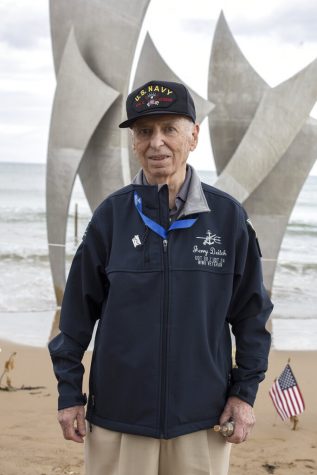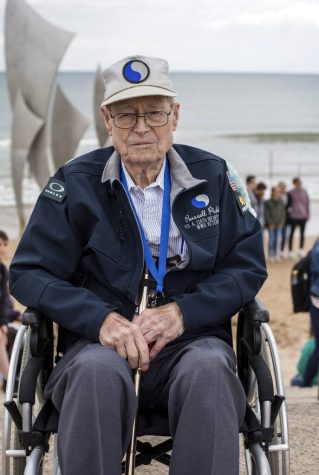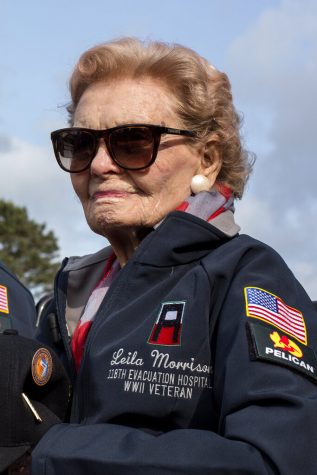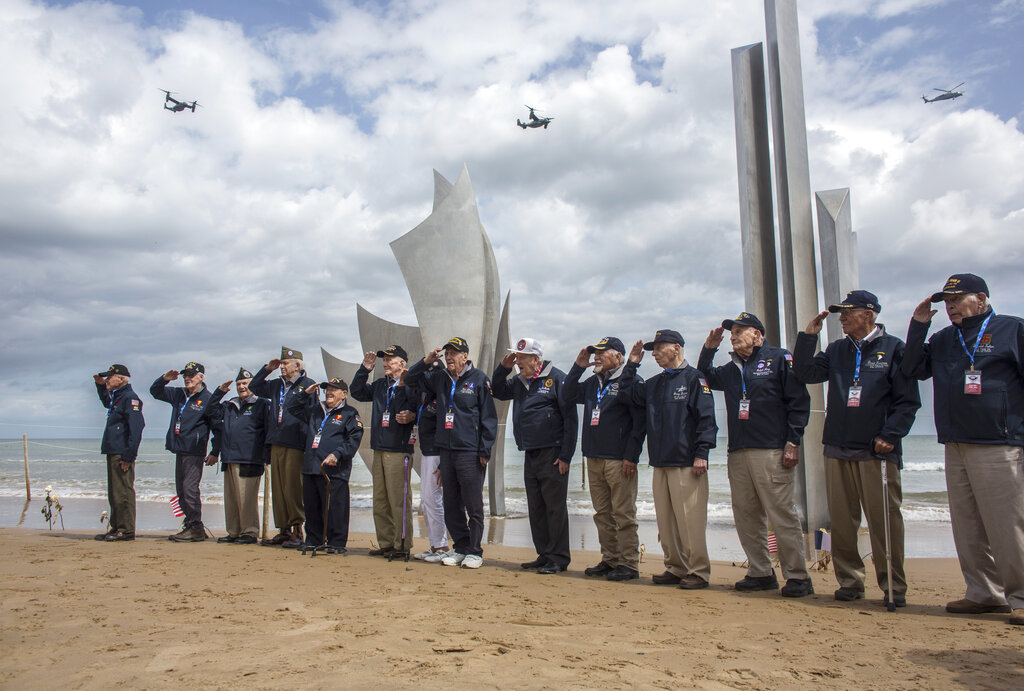75 years later, D-Day vets remember what they left behind
June 3, 2019
OMAHA BEACH, France – They are back, some for the first time since war stole their innocence 75 years ago on Normandy’s D-Day beaches.
They are back on battlefields where the World War II veterans saw friends killed, took lives themselves, were scarred physically and mentally and helped change the course of history.
Given the painful memories, given their unfamiliarity with the country they liberated, given the difficulty of traveling abroad, why are Americans and veterans from other Allied nations in their 90s coming back for this week’s anniversary of the June 6, 1944, invasion of Normandy?
For many, returning is a duty, a way to honor fallen comrades and fulfill promises they made as young men never to forget each other. Some buried their memories for decades but feel a compulsion to face their demons before going to their graves. Many fear the world is forgetting and want young people to hear their stories one last time.
The inevitability of all veterans of the 1939-1945 war being gone soon is acting as a clarion call. From across the globe, people are converging on Normandy to follow in the footsteps of, perhaps even rub shoulders with, the remaining men and women who made a military success of D-Day.
Here, in their own words, veterans explain why they’re back for this week’s anniversary.
Jerry Deitch, 93, U.S. Combat Demolition Unit

United States World War II veteran Jerry Deitch, from Nevada, poses at Omaha Beach in Saint-Laurent-sur-Mer, Normandy, France, Monday, June 3.
Deitch thinks he’ll be able to keep his nerves in check but isn’t sure. The survivor of Utah Beach, one of the five D-Day beaches, had always refused to go back to Normandy.
“I said, ‘No,’ I said, ‘I don’t think I can handle it. I’ll get too emotional,’” he says.
Now 93 years old, Deitch decided he must see where good friends died and revisit the spot by a seawall where he was hit by a piece of shrapnel that left a fist-sized dent in his helmet.
Deitch, who is from Nevada, was 18 years old when he landed and says “after the first day I felt like I was 30. I went in a little boy and came out a man. You grow up fast.”
Serving in a U.S. combat demolition unit, his job was to clear obstacles and blow up strong points that could slow the Allied advance inland. The shrapnel that dented Deitch’s helmet gave him a concussion; he was evacuated back to England.
“I know exactly where I was when I was hit. Exactly the spot. I see it in my mind all the time,” he said.
Long unable to speak to his family about his experiences, he recently started writing down his recollections so they’ll know, when he’s gone, what he went through. “I did a few chapters just before I came here,” Deitch says.
“It changed my life, yeah,” he said of D-Day. “It taught me to be very tolerant. God gives us free will; you’ve got to use it.”
Having long kept his war to himself, Deitch thanks people for listening to his recollections now.
“I feel better when I speak about it,” he said. “If you have demons, face them.”
His wife, Selma, felt the trip would be too arduous and stayed home. They’ve been married 71 years.
Russell Pickett, 94, 29th Infantry Division

United States World War II veteran Russell Pickett, from Tennessee, poses at Omaha Beach in Saint-Laurent-sur-Mer, Normandy, France, Monday, June 3, 2019.
Pickett has made several return visits to Normandy. He says coming back helps him cope with the horrors he’s lived with since he was a 19-year-old in the first wave of American troops aiming for Omaha Beach, the bloodiest of the D-Day landing zones.
The former private in the 29th Infantry Division was immediately injured and he still suffers from post-traumatic stress disorder.
“For a long time, I really didn’t want to come back, and I kind of dreaded it,” he said. “I can’t say that I really enjoy the whole thing, you know? When I head back on the beach and all that kind of stuff, sometimes it does things to you. But like this, you can see kind of what we was fighting for and, you know, that makes a little difference.”
With a flamethrower strapped to his back, Pickett was wounded when an explosion tore at the landing craft transporting him onto a beach which was sprayed by German machine-gun and artillery fire.
He blacked out and woke up on the water’s edge, next to a dead body and unable to move his legs. Plucked out of the water by another landing craft, he was hospitalized in England and then returned to Normandy, where he fought in the dense hedgerows that slowed the Allied advance and was injured again.
Pickett says he long tried to deal alone with his trauma before finally seeking medical help.
“I’ve got it now where I can handle it pretty well, because you live the war almost every night, you see? And you don’t get rid of it, no matter what you do,” he says. “I would love to forget it, totally forget it, but no way, especially when you go through a battle like D-Day.”
Leila Morrison, 96, U.S. Army combat nurse

United States World War II veteran Leila Morrison, from Colorado, poses at Normandy American Cemetery in Colleville-sur-Mer, Normandy, France, Monday, June 3.
The last time Leila Morrison saw Omaha Beach was when she landed on it in 1944, three months after D-Day, when she came to nurse soldiers injured in combat.
“I felt as though when I stepped on that sand I was stepping on sacred grounds because so many people had given their all for it. It was just plain sand,” she recalls.
At the end of the war, she nursed survivors of the Buchenwald concentration camp.
“I want to tell the French and the whole world how great it is that we do have our freedom, and we have so many privileges in America that other places don’t have,” Morrison says.
“Every day is a memorial day for me. I see those young fellas that didn’t make it. So many of them, and I am thankful over and over again.”
___
Helen Patton, a granddaughter of famed American tank commander Gen. George S. Patton Jr., is back in Normandy for the 75th anniversary with a message that younger generations should enjoy the liberties so many soldiers fought and died for.
Presiding Monday at a game of American football played close to the landing beaches, she quoted from a poem written by her grandfather during World War I to convey the idea that part of honoring those sacrifices is relishing life:
“When I sit in my tank and wait for the hour for the great barrage to come down, I wish to god there was one more day for raising hell in town.”
